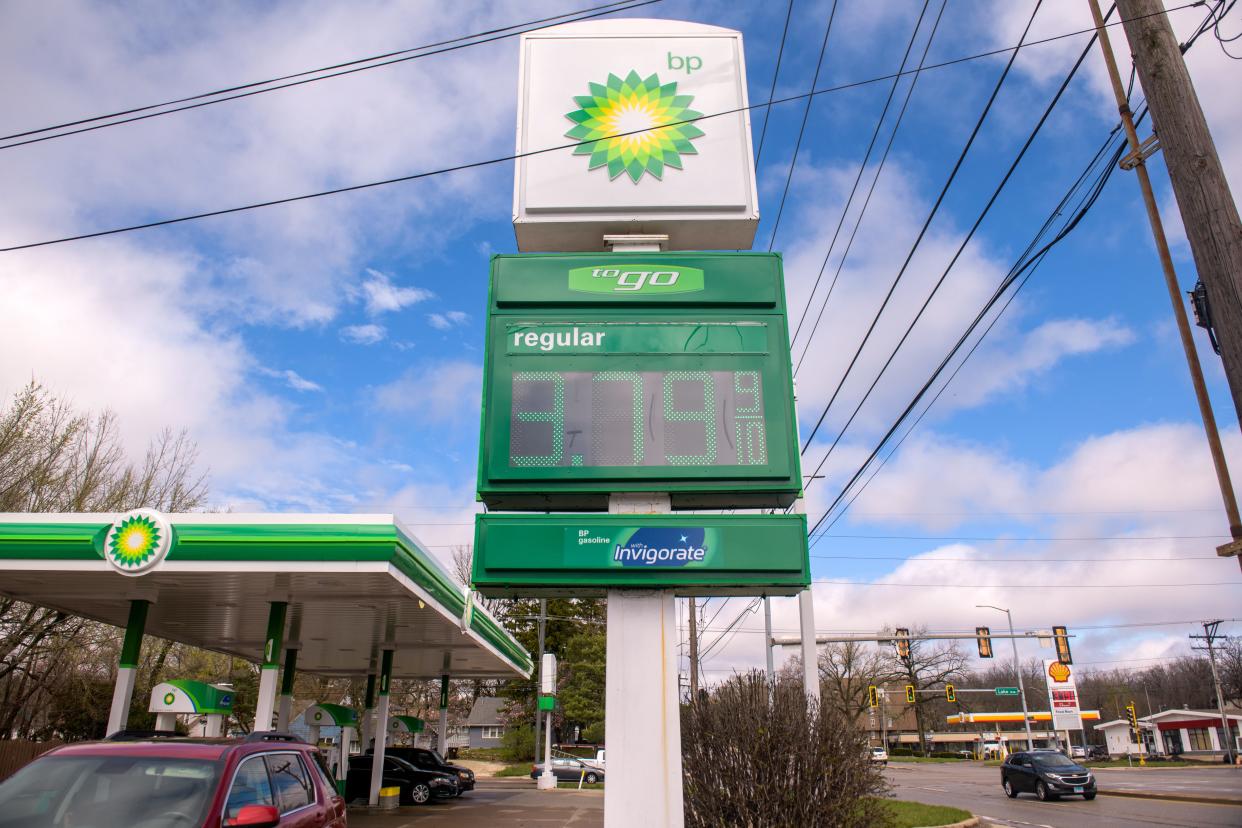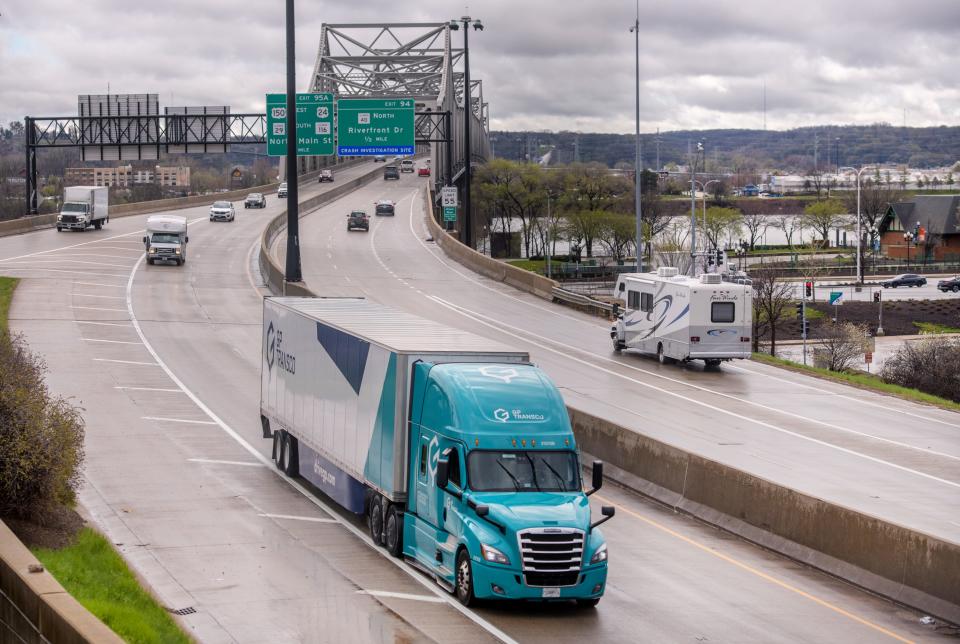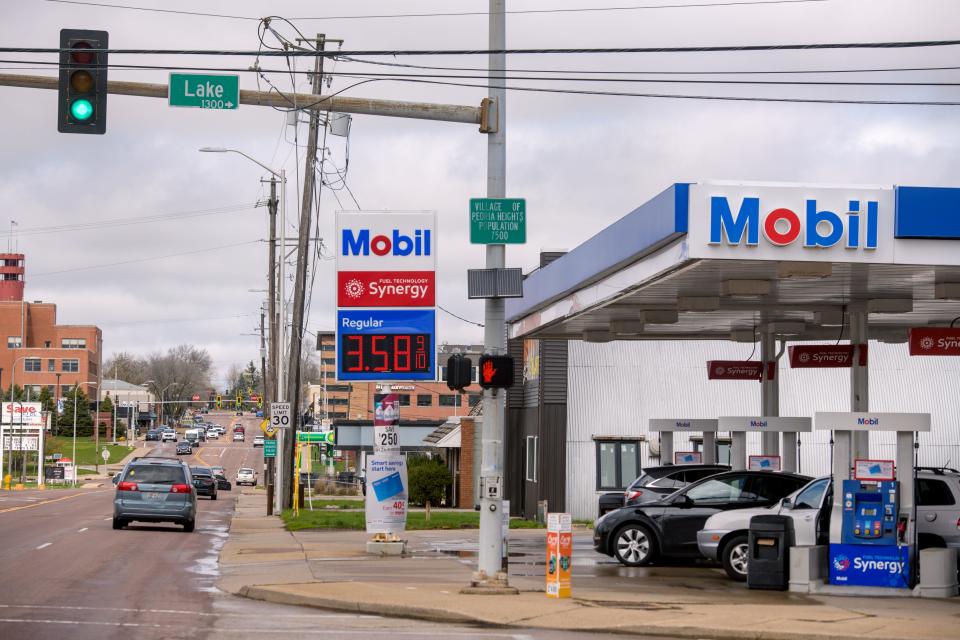Could this climate bill raise gas prices in Illinois? That depends on who you ask

- Oops!Something went wrong.Please try again later.
A bill proposed by Peoria state Sen. Dave Koehler aimed at lowering carbon emissions into the atmosphere could result in higher gas prices, opponents to the legislation say.
Koehler, who proposed SB 1556 — also known as the Clean Transport Standard — says any fears that his bill would raise gas prices is a "scare tactic" being used by its opponents and the legislation is something that needs to happen now to tackle climate change.
"This is a huge deal for Illinois. We need to continue to be the pace setter for being serious about climate change issues, which currently our atmosphere is our No. 1 issue," Koehler said. "I am committed to seeing this thing through."
Stakeholders debate bill's impact on gas prices
The bill would set up a credit and deficit system for certain kinds of energy used in Illinois for transportation. Energy, such as electricity or other low carbon fuels, would earn a "credit" when put to use. That credit would be bought by a bank, providing an incentive for someone to use a low carbon source of energy.
However, a distributor or refiner of a type of energy that does not meet the carbon standard set by this bill would receive a "deficit" — or what opponents to the bill liken to a tax. The refiner or distributor receiving a deficit would be required to buy one of the credits from the bank.
More: Magazine recognizes Illinois and Texas for positive business climates
Koehler said this bill will help Illinois reach its decarbonization goals and follows the lead set by states such as California, Oregon and Washington, which have put similar measures in place. Those are also among the five states with the highest gas prices, according to Forbes.
A 10 to 12 cent rise in gas prices in California was attributed to the state's low carbon fuel standard, and a study by the California Air Resources Board said the fuel standards could lead to a 47-cent increase in gas prices in 2025, according to Politico's E&E News.
Matt Hart of the Illinois Trucking Association says his group's biggest concern with the bill is the impact they foresee it having on diesel fuel prices. The standard set in California is projected to have a 59-cent impact on diesel fuel prices next year, according to E&E News.
Hart said the trucking association is "all about the environment" but said they do not like the projected costs associated with this bill.
"There needs to be a balance between helping the environment and running the most environmentally friendly vehicles that are available but also doing it in a way that's not going to make it costly and hurt our state and hurt our economy."

Koehler said his bill is modeled closely after Oregon's GREET system, which assigns certain types of fuel a "carbon intensity score" based on the life cycle of a fuel which includes its direct emissions from transportation and use.
Oregon has argued, however, that its system does not have a straightforward impact on gas prices and fuel prices are impacted by a litany of factors outside of this law. Koehler makes the same argument for Illinois.
"I pointed out in a hearing that the price of gas in the last month rose 25 cents — that didn't have anything to do with this bill, we haven't passed the bill," Koehler said. "I think that's pretty much a scare tactic. They don't want this, they want life to go on as usual and emit as much carbon as you can and not worry about it. This is a bill that says 'climate change is serious and we need to do something about it now.'"
More: Looking for the best solar eclipse view in Illinois? What to know about the April 8 eclipse
Push for a statewide study
Josh Sharp of the Illinois Fuel and Retailers Association said the bill in Illinois should not be passed until the state does a study of its own on how it could impact fuel prices. The Illinois Climate and Equitable Jobs Act of 2021 was supposed to appoint a commission to look at carbon fuel pricing, but no commission has yet been formed.
"For us, it's really imperative the state do their homework first and find out what kind of costs this might have before we proceed," Sharp said.
Sharp argues this bill would lead to gas prices going up because the penalty imposed on fuels that don't meet the standard would start at the refiners and be passed down the line to retailers and, eventually, to consumers.
The bill is also "technologically neutral," Koehler said. Which means it sets a standard for energy but does not tell people how they have to reach the standard. But, the "bottom line is they have to lower their carbon intensity scores."
"If you want to look at hydrogen, if you want to look at electric, if you want to look at renewable biofuels, all of those are fair game," Koehler said. "We're not saying you have to be electric or bio diesel."
Hart argues the trucking industry has already done a good job over the last three decades lowering their emissions, he says they've reduced their emissions by 98% in the U.S. A study done by the American Trucking Associations says new trucks have lowered their emissions 98% over the past three decades.
"Really what we're doing is arguing about the last two percent — and we're committed to closing the last two percent — but we've got to do it with technology that's available and also with technology that's affordable so we can continue to deliver Americans goods at a price (people are) willing to pay," Hart said.

Can Illinois set the standard for the Midwest?
Koehler and his team are currently working on another amendment for the bill. He said they hope to have it done within a month but added this is something he wants to "get done right, not fast." If the bill has to wait until a later legislative session to become law, Koehler said that is a satisfactory outcome.
The coming amendment is ironing out details on how the credit system works, among other things, at the request of some agriculture groups, Koehler said.
"Illinois is probably the farthest along in this among any Midwestern state, and I think it would be important for us to kind of set the standard," Koehler said. "It's important for the Midwest for us to set the standard because agriculture would be a big player in this and, of course, agriculture is our No. 1 industry."
Hart and Sharp said, however, they believe a national approach and a federal bill is the best route for this kind of measure so that states are not put on an uneven playing field.
"What we don't want to do is incentivize a company to just locate their company in a different state so they can avoid this altogether," Hart said.
More: Here are the 10 best places to live in Illinois, according to this travel magazine
This article originally appeared on Journal Star: Opponents to new Illinois climate bill say it would raise gas prices

